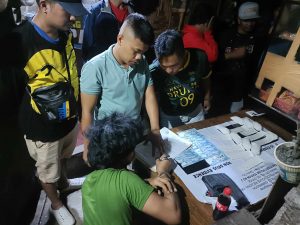City, Task Force Davao closely monitoring all returning LSIs
THE CITY is closely monitoring locally stranded individuals (LSIs) as they continue to trickle in and make sure they do roam around before their 14-day mandatory quarantine is over.
Dionisio Abude, Davao City Transportation and Traffic Management Office (CTTMO) head, said they have assigned a dedicated motorcycle team whose main task is to escort LSIs either to the borders or to the testing laboratories for them to get swabbed.
“We wait until their results are out,” he said over the Davao City Disaster Radio.
Abude said it is necessary to monitor their movements while they await the results of their reverse transcript polymerase chain reaction (RT-PCR) test. They might become complacent if they do not manifest any symptoms and believe they are free from COVID-19.
“When they receive their results, we will escort them to the facility if it is mandated or to their destination,” he said.
He added that due to the number of returning LSIs, the Task Force Davao and the Traffic Group have worked together in escorting the LSIs.
The LSIs coming home to the city via the Francisco Bangoy International Airport are required a negative RT-PCR result before they may return to their residences. Meanwhile, those entering the city by land transport are immediately escorted to testing laboratories.
As for non-Davao City residents, they are escorted toward the exit points of the city where they await transport from their local government units. As of this writing, a total of 601 LSIs have returned to the city through the barangays Sirawan, Alejandra Navarro, and Lacson checkpoints.
Region-XI has 124 new
COVID cases in 2 days
Meanwhile, the Department of Health XI recorded 124 new cases of COVID-19 in two days, 76 of them reported on Thursday, the highest single-day increase since March.
From March 15 until August 28, the total number of cases in the region had breached the 2,000 mark – at 2,063 – with Davao City posting the highest at 1, the city already reached 1,342 or 65% of the regional total, according to the DOH-Davao’s Center for Health Development.
Of 124 new cases recorded on August 27 and 28, 98 were local transmissions, 14 were locally stranded individuals, two returning overseas Filipinos, and 10 for verification.
Davao City reported 102 new cases over the last two days – 57 on August 27 and 45 on August 28. Davao del Norte and Davao del Sur recorded seven each, and Davao de Oriental and Davao de Oro with four each for August 27 and 28.
As of August 28, the region posted 2,063 cases, 457 of these classified as active, 66 deaths 1,023 recoveries.
Davao City topped the regional total with 1,342 cases, 265 of these active; 54 deaths and 1,023 recoveries.
Davao del Norte recorded 218 cases, 63 of them active, four deaths and 151 recoveries; Davao Oriental has 195 cases, 28 of these active, one death and 166 recoveries; Davao del Oro posted 159 cases, 68 of these active, one death and 90 recoveries; Davao del Sur has 109 cases, 23 of these active, four deaths and 82 recoveries; and Davao Occidental recorded 40 cases, 10 of these active, two deaths and 128 recoveries.
As of August 28, the DOH-Davao also reported that a total of 57,265 specimens had been processed for the RT-PCR in the state-run Southern Philippines Medical Center and Davao Region Medical Center, and the private laboratory, One World Diagnostic Center.
Despite the reported surge in the COVID-19 cases here, Mayor Sara Duterte said during her interview over the city-run Davao City Disaster Radio (DCDR 87.5) that she had been informed by the Inter-Agency Task Force that the city would remain under a modified general community quarantine (MGCQ) from September 1 to 30.
The entire city was placed under community quarantine from mid-March to 9 p.m. on April 4, enhanced community quarantine from April 4 to May 15, general community quarantine from May 16 until June 30, and MGCQ beginning July 1.
She reiterated her appeal to the Davaoeños, to the management of offices and establishments, to strictly follow the basic health protocols, to slow down the transmission of COVID-19 infection in the city.
“What we want the people to do is for them to police themselves. Although we are trying to open our city, you still need to observe quarantine, and then number 2, health protocols. It’s important to wear a mask, observe distancing, and frequent hand washing. We need to help each other by following these health protocols when we go out,” she said.
She said that the city might revert to ECQ once the surge becomes unmanageable. (Antonio L. Colina IV / MindaNews)




